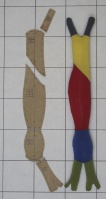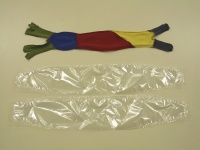Developing Heart
A flexible model to demonstrate the early development of the heart to first year health science students and developmental classes.
Production Information
Made from several colours of knit fabric. The background grid in the pattern photo is 100mm x 100mm. Also prepare two long, oversized plastic bags. These should be able to be well sealed once filled. Double-bagging is a good idea.
The flexible filling is "Floam". Floam is made from "Slime", with added grated polystyrene. Slime recipes are readily available on the internet on kids make-it sites e.g. http://chemistry.about.com/cs/howtos/ht/slime.htm. For this model we used the following recipe:
- Make a 6 - 8% solution of Polyvinyl Alcohol (e.g. Sigma P8136, average molecular weight 30,000 to 70,000, H2O soluble) - tapwater fine, takes a while to dissolve (at least overnight) and can be sped up with a little heat
- Make a similar volume of a 2 - 4% solution of Sodium tetraborate decahydrate - warm tapwater works well
- Stir the PVA slowly into the borax - a clear gel (Slime) will polymerise
- Pour off any excess water and knead the slime into a blob
- Prepare a similar volume of small polystyrene balls (working inside a big plastic bag, grate a polystyrene container into small pieces) and knead into the slime - this is now Floam
Creators: Dr Christine Jasoni (initial idea and academic support), Fieke Neuman (patterns, sewing, floam). All from Department of Anatomy, University of Otago.
Keywords: Teaching, Anatomy, Development, Heart, Ventricle, Atrium, Science, Biology
This work is licensed under a Creative Commons Attribution-NonCommercial-ShareAlike 4.0 International License


